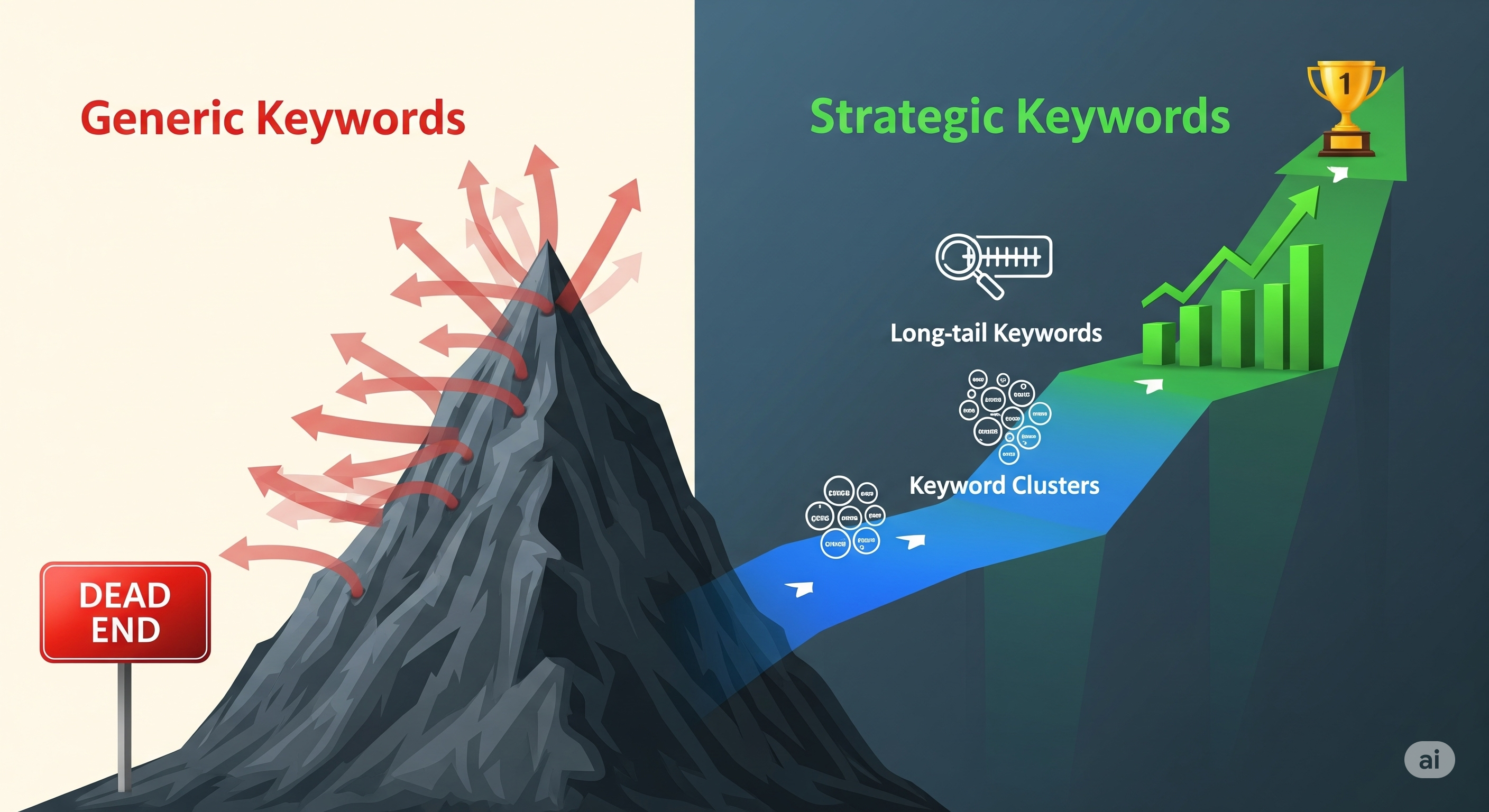Also read:
- How to Do SEO for Your New Website – 10 Step Guide
- 10 New SEO Terms Changing The Game
- The Ultimate Guide To SEO Terminology
- 11 Types Of Keywords in SEO
As a business just beginning its digital journey, the temptation is to aim for the most popular and generic keywords. Terms like “digital marketing” or “real estate” have massive search volumes, and the logic seems sound: target the biggest audience to get the most traffic.
However, this is a common and costly misconception.
Aiming for these broad, “short-tail” keywords right out of the gate is like trying to win a marathon without ever having run a mile. The competition is immense, the resources required are enormous, and the frustration of not ranking for months on end is a recipe for abandoning your SEO efforts entirely.
Our methodology is designed to prevent this exact scenario. We shift the focus from a “search volume race” to a strategic, patient, and highly effective approach that builds authority from the ground up.
Step 1: The Foundation – Understanding Your Business & Your Audience
Before we even touch a keyword tool, we start with a deep dive into your business. Keyword selection is not a numbers game; it’s a strategic process. We will help you answer these core questions:
- What specific problems do you solve?
- Who is your ideal customer? What are their pain points, and how do they search for solutions?
- What makes your business unique? What is your unique selling proposition (USP)?
- What is your immediate geographic focus? (e.g., a specific city, neighborhood, or country).
This foundational step ensures that every keyword we select is directly aligned with your business goals and your target audience, not just random search queries.
Step 2: The Right Method – Embracing Long-Tail Keywords
We will guide you away from generic, highly competitive “short-tail” keywords and towards more specific, high-intent “long-tail” keywords.
- Short-tail keywords: “Real estate”
- Problem: Massive competition, vague search intent.
- Long-tail keywords: “Best real estate agent in Faridabad for commercial property”
- Benefit: Lower competition, clear search intent (they are ready to act), and much easier for a new business to rank for.
By focusing on long-tail keywords, we secure quick wins, attract highly qualified traffic, and build initial authority without burning through resources.
Step 3: Keyword Research in Action – The “Cluster Content” Approach
Instead of targeting just one keyword per URL, we implement a cluster content strategy to maximize the ranking potential of every page. Our approach involves selecting a primary keyword and then a cluster of 3-4 related, secondary keywords to support it.
- Primary Keyword: The main, high-value keyword for a page.
- Supporting Keywords: 3-4 related keywords that add context, answer related questions, and strengthen the page’s authority on the topic.
Example for a Real Estate Dealer in Faridabad:
- Target URL: /real-estate-services-faridabad/
- Primary Keyword: “best real estate agent in Faridabad”
- Supporting Keywords:
- “top property consultants in Faridabad”
- “Faridabad property dealer reviews”
- “real estate services in Faridabad”
- “realtor near me Faridabad”
This strategy creates a comprehensive, authoritative page that search engines love. It tells Google that your page is not just relevant for one term but for an entire topic, dramatically increasing your chances of ranking for all five keywords in the cluster.

Step 4: Vetting Your Keywords – The Reality Check
Once we have a list of potential keywords, we don’t just proceed. We vet them using professional SEO tools to analyze two critical metrics:
- Search Volume: We identify a healthy, realistic search volume that indicates genuine interest.
- Keyword Difficulty (Competition): This metric tells us how hard it will be to rank on the first page. For a new business, we focus on keywords with low to medium difficulty, even if their search volume is not astronomical.
This step prevents us from wasting resources on unwinnable battles. We build your online presence with achievable goals, one success at a time.
Step 5: Mapping Keywords to Content – Execution
The final step is to strategically map these keyword clusters to specific pages on your website.
- The “Real Estate Agent” cluster will be optimized for your main service page.
- A “First-Time Home Buyer” cluster will be mapped to a blog post.
- An “Investment Properties” cluster will be mapped to a specific service or landing page.
This structured approach forms the backbone of a robust content strategy that is designed for sustainable, long-term organic growth.

Frequently Asked Questions (FAQs)
1. What is SEO keyword selection?
It’s the process of choosing the right words and phrases to target in your content for better search rankings.
2. Why is keyword research important for SEO?
It helps you understand what your audience is searching for and ensures your content matches their intent.
3. How do you find the right keywords?
By using tools like Google Keyword Planner, Ahrefs, or Ubersuggest to discover relevant, high-traffic terms.
4. What types of keywords should I focus on?
A mix of short-tail, long-tail, informational, and transactional keywords works best.
5. How often should keyword research be done?
Regularly—ideally every 3–6 months or before launching new content or campaigns.
6. Do keywords still matter with AI in SEO?
Yes. While AI helps with context, keywords still guide visibility and relevance for search engines.
7. Should I track keyword performance?
Absolutely. Monitoring helps you refine your strategy and improve rankings over time.
Conclusion:
By following this strategic methodology, we can move you away from the frustration of generic, high-competition keywords and towards a data-driven, methodical approach. This builds a solid digital foundation, attracts high-quality traffic from day one, and ensures your resources are invested wisely for the kind of organic growth that truly impacts your bottom line.





